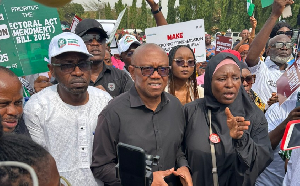There are clear signals that the federal government is contemplating a new subsidy for electricity generation companies (GenCos) to mitigate the impacts of the recent increase in gas prices imposed by producers.
It has been reported that the Nigeria Electricity Regulatory Commission (NERC), in collaboration with key stakeholders in the industry, is in the final stages of finalising a new agreement for the sector.
Stakeholders insist that a subsidy in the sector will translate to a reduction in tariffs for electricity users and improve electricity supply across the country.
An analysis of the sector regulator's most recent report reveals that the federal government's subsidy to the electricity sector has experienced a significant decrease of approximately 80% between 2019 and 2022.
Zainab Ahmed, the former minister of finance, announced the removal of government's subsidy in the sector in in 2022. This decrease comes at a time when power companies are requesting an increase in power tariffs.
Approximately 80% of Nigeria's power plants rely on gas as their primary energy source.
This has compelled the federal government to take notice of their challenges and address them.
The GenCos are facing outstanding debts of more than N1 trillion owed by the electricity distribution companies through the Nigerian Bulk Electricity Trading (NBET).
The GenCos lament being unable to make power available due to the enormous debts owed them by electricity distribution companies (DisCos) and the Transmission Company of Nigeria (TCN) through the Nigerian Bulk Electricity Trading Plc.
As a result of the poor remittance, the GenCos are also unable to pay their gas suppliers and meet other operational expenses efficiently.
The Niger Delta Power Holding Company (NDPHC) alone carries a substantial debt burden, amounting to a staggering N198 billion.
Notably, this company is the largest generation entity in Nigeria, contributing 4,000MW to the national grid.
Chiedu Ugbo, the Managing Director of the Niger Delta Power Holding Company (NDPHC), disclosed that the primary hurdle confronting GenCos is the dollar-denominated cost of the gas used by these plants.
According to Leadership, this translates to a payment of 2.18 cents per cubic foot, being the equivalent in naira.
Ugbo, therefore, made a plea to gas producers, urging them to reconsider their current approach of pricing domestically produced natural gas in foreign currency.
He expressed dissatisfaction with the practice of selling domestic gas in dollars, emphasizing that the recent unification of exchange rates has resulted in an increase in the cost of gas used to operate power plants.
If we can find a means to reduce the cost of gas, at least, for domestic consumption that would help a lot. Gas should not be denominated in US dollars and then be exposed to vagaries in the forex market.
The NERC's third-quarter report highlights that government assistance to the Nigerian Electricity Supply Industry (NESI) decreased from N49.50 billion in 2019 to N10.17 billion by the fourth quarter of 2022.
According to NERC's Market Competitive Report, it is contended that the end-user tariff subsidy in Nigeria primarily favours higher-income groups, as they consume a more significant amount of electricity than lower-income groups.
Consequently, the top-income bracket benefits more from the subsidy than lower-income earners.
Business News of Friday, 13 October 2023
Source: www.legit.ng













